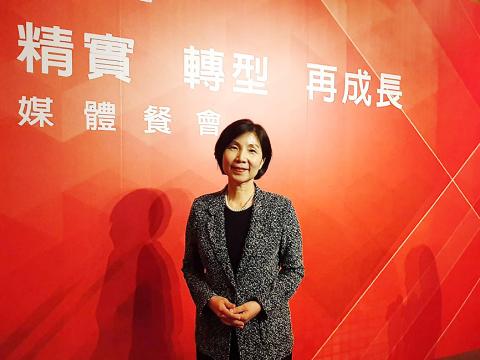Far EasTone Telecommunications Co Ltd (遠傳電信) aims to boost the revenue contribution of “new economy” services to 20 percent over the next three to five years to limit the impact of eroding traditional services, the telecom said yesterday.
To stem a revenue slide, Far EasTone last year set up a “transformation office” to step up overhaul efforts, as the company looks primarily to “new economy” services — businesses related to big data, artificial intelligence and the Internet of Things (IoT) — to increase revenue sources.
Leveraging those technologies, Far EasTone provides cybersecurity solutions, cloud-based solutions and IoT services for enterprise customers, as well as digital services such as online music streaming and mobile commerce for consumers, the company said.

Photo: CNA
“In Taiwan, traditional telecom service revenue began sliding in 2015. From 2016 to 2017, telecom services in Taiwan fell 3 percent,” Chee Ching (井琪), Far EasTone’s new president and acting head of the transformation office, told the media yesterday.
The company’s revenue unexpectedly fell at a faster rate last year, more than 5 percent year-on-year, after the nation’s biggest telecom operator, Chunghwa Telecom Co (中華電信), triggered a major price war by slashing the threshold for 4G subscription services to NT$499 a month.
The extremely low flat rate cut into the financial performance of every telecom last year, Ching said, adding that the nation’s “major players feel the need to transform themselves and speed up their efforts.”
“Regarding transformation, we do not intend to shed our role of being a traditional telecom service provider, but we intend to go beyond that role. We want to offer more services than just offering SIM cards and mobile phones,” she said.
Far EasTone expects the contribution from its “new economy” businesses to increase to 13.5 percent of total service revenue this year, from 10 percent last year, thanks to growing Internet traffic, rising demand for curbing cyberattacks and local manufacturers’ increasing desire to improve efficiency and cut costs by adopting automation systems, she added.
“The nation’s IoT market is just waking up,” Ching said. “The pie will grow to 20 percent within three to five years.”
By that time, the percentage of Far EasTone’s technicians employed in “new economy” services would rise to 30 percent, from 20 percent now, she said.
Asked about the price war, Ching said that “it was not our strategy to start a price war.”
The price war “will eventually die down,” she said, adding that recent low-price promotions by local rivals have interested fewer consumers.

CAUTIOUS RECOVERY: While the manufacturing sector returned to growth amid the US-China trade truce, firms remain wary as uncertainty clouds the outlook, the CIER said The local manufacturing sector returned to expansion last month, as the official purchasing managers’ index (PMI) rose 2.1 points to 51.0, driven by a temporary easing in US-China trade tensions, the Chung-Hua Institution for Economic Research (CIER, 中華經濟研究院) said yesterday. The PMI gauges the health of the manufacturing industry, with readings above 50 indicating expansion and those below 50 signaling contraction. “Firms are not as pessimistic as they were in April, but they remain far from optimistic,” CIER president Lien Hsien-ming (連賢明) said at a news conference. The full impact of US tariff decisions is unlikely to become clear until later this month

With an approval rating of just two percent, Peruvian President Dina Boluarte might be the world’s most unpopular leader, according to pollsters. Protests greeted her rise to power 29 months ago, and have marked her entire term — joined by assorted scandals, investigations, controversies and a surge in gang violence. The 63-year-old is the target of a dozen probes, including for her alleged failure to declare gifts of luxury jewels and watches, a scandal inevitably dubbed “Rolexgate.” She is also under the microscope for a two-week undeclared absence for nose surgery — which she insists was medical, not cosmetic — and is

GROWING CONCERN: Some senior Trump administration officials opposed the UAE expansion over fears that another TSMC project could jeopardize its US investment Taiwan Semiconductor Manufacturing Co (TSMC, 台積電) is evaluating building an advanced production facility in the United Arab Emirates (UAE) and has discussed the possibility with officials in US President Donald Trump’s administration, people familiar with the matter said, in a potentially major bet on the Middle East that would only come to fruition with Washington’s approval. The company has had multiple meetings in the past few months with US Special Envoy to the Middle East Steve Witkoff and officials from MGX, an influential investment vehicle overseen by the UAE president’s brother, the people said. The conversations are a continuation of talks that

CHIP DUTIES: TSMC said it voiced its concerns to Washington about tariffs, telling the US commerce department that it wants ‘fair treatment’ to protect its competitiveness Taiwan Semiconductor Manufacturing Co (TSMC, 台積電) yesterday reiterated robust business prospects for this year as strong artificial intelligence (AI) chip demand from Nvidia Corp and other customers would absorb the impacts of US tariffs. “The impact of tariffs would be indirect, as the custom tax is the importers’ responsibility, not the exporters,” TSMC chairman and chief executive officer C.C. Wei (魏哲家) said at the chipmaker’s annual shareholders’ meeting in Hsinchu City. TSMC’s business could be affected if people become reluctant to buy electronics due to inflated prices, Wei said. In addition, the chipmaker has voiced its concern to the US Department of Commerce